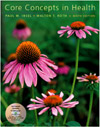 |  Core Concepts in Health, 9/e Paul M. Insel,
Stanford University School of Medicine
Walton T. Roth,
Stanford University School of Medicine
The Use and Abuse of Psychoactive Drugs
Chapter Outline
This chapter focuses on psychoactive drugs-those designed to alter a person's experiences or consciousness-and their short- and long-term effects and potential for abuse and addiction.
- Addictive behavior
- Drug use, abuse, and dependence
- Drug use changes brain chemistry in fairly predictable ways, but the noticeable effects may vary depending on drug factors, user factors, and social factors.
- The major psychoactive drugs are opioids; central nervous system depressants; central nervous system stimulants; marijuana and other cannabis products; hallucinogens; and inhalants.
- Drug use: the decades ahead
|
|



 2002 McGraw-Hill Higher Education
2002 McGraw-Hill Higher Education